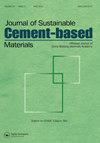Limestone replacements by fine crushed concrete and ceramic wastes during the production of Portland cement
IF 4.2
3区 工程技术
Q1 CONSTRUCTION & BUILDING TECHNOLOGY
Journal of Sustainable Cement-Based Materials
Pub Date : 2023-06-15
DOI:10.1080/21650373.2023.2225189
引用次数: 3
Abstract
Abstract This study assesses the feasibility of limestone (LS) replacement by recycled fine aggregates (RFAs) on grindability and Portland cement properties. Two RFA types generated from the fine fraction of crushed concrete and ceramic wastes are ground in 22-liters grinding mill at 310 and 400 ± 20 m2/kg Blaine fineness, and then incorporated at 20% and 35% rates in clinker cement mixtures. Because of their porous nature, RFAs required about 22% to 30% less communition energy than LS, which could be advantageous to reduce grinding costs for given Blaine fineness. Mortars prepared with RFA-based cements yielded better strength recovery over time and lower water sorptivity than LS-based cement, either due to promoted hydraulic activity or pozzolanic reactions. The comminution of RFA fillers to 400 ± 20 m2/kg fineness is a viable alternative to mitigate the dilution effect while maintaining similar grinding energy and mechanical strengths as the control 95% clinker cement.在硅酸盐水泥生产过程中,用细碎混凝土和陶瓷废料代替石灰石
摘要本研究评估了再生细骨料(rfa)替代石灰石(LS)的可磨性和硅酸盐水泥性能的可行性。在22升的磨机中以310和400±20 m2/kg Blaine细度研磨两种RFA,然后以20%和35%的比例加入熟料水泥混合物中。由于其多孔性,rfa所需的通信能量比LS少22%至30%,这有利于降低给定Blaine细度的研磨成本。与ls基水泥相比,rfa基水泥制备的砂浆具有更好的强度回复率和更低的吸水率,这可能是由于水力活性增强或火山灰反应。将RFA填料粉碎至400±20 m2/kg细度是一种可行的替代方案,可以缓解稀释效应,同时保持与对照95%熟料水泥相似的磨矿能量和机械强度。
本文章由计算机程序翻译,如有差异,请以英文原文为准。
求助全文
约1分钟内获得全文
求助全文
来源期刊
CiteScore
6.60
自引率
15.90%
发文量
71
期刊介绍:
The Journal of Sustainable Cement-Based Materials aims to publish theoretical and applied researches on materials, products and structures that incorporate cement. The journal is a forum for discussion of research on manufacture, hydration and performance of cement-based materials; novel experimental techniques; the latest analytical and modelling methods; the examination and the diagnosis of real cement and concrete structures; and the potential for improved cement-based materials. The journal welcomes original research papers, major reviews, rapid communications and selected conference papers. The Journal of Sustainable Cement-Based Materials covers a wide range of topics within its subject category, including but are not limited to: • raw materials and manufacture of cement • mixing, rheology and hydration • admixtures • structural characteristics and performance of cement-based materials • characterisation techniques and modeling • use of fibre in cement based-materials • degradation and repair of cement-based materials • novel testing techniques and applications • waste management

 求助内容:
求助内容: 应助结果提醒方式:
应助结果提醒方式:


